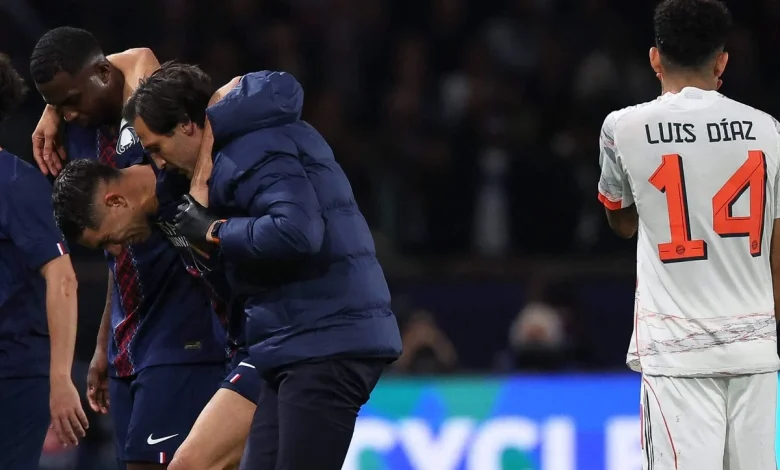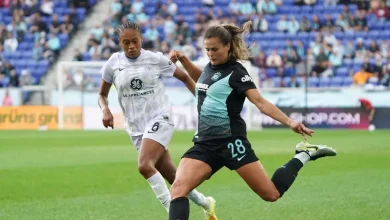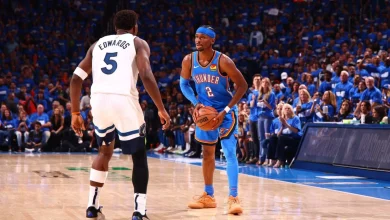PSG 1 Bayern Munich 2: What happened with Diaz and Hakimi? Was Dembele risk required? Kane sets the tone

Bayern Munich beat Paris Saint-Germain 2-1 on a Champions League night marred by a worrying injury to PSG right-back Achraf Hakimi following a challenge by Luis Diaz.
Diaz had scored in the fourth and 32nd minute to put Bayern in full control at the Parc des Princes — the first after a Michael Olise shot was saved by goalkeeper Lucas Chevalier and the second when he expertly dispossessed centre-back Marquinhos. But the former Liverpool winger’s foul from behind on Hakimi just before half-time led to the Morocco international leaving the pitch in tears, and an initial yellow card being upgraded to a red.
Substitute Joao Neves gave PSG hope with his 74th-minute volley, but Bayern held on for an important league-phase win. It was a 16th consecutive victory in all competitions, extending their record for a team in Europe’s top five leagues.
Here, Seb Stafford-Bloor, Elias Burke and Conor O’Neill break down what happened.
What happened with Diaz and Hakimi?
What a strange night for Diaz.
His tackle on Hakimi before half-time initially just looked like a bad accident. It appeared to be a case of the Moroccan getting his foot caught under an opponent who was trying to make a fair challenge, and then the referee reacting to the severity of the injury. Hakimi left the pitch in tears.
But that is too generous to Diaz. Even though his studs were not up and the tackle was not high, the force of the challenge — shown most vividly from the front-on angle during the VAR review — made it reckless. There was no intent to hurt Hakimi but that is not the point here. Putting an opponent at unnecessary risk is what guides decisions and Diaz did that, so he was deservedly sent off.
Needlessly, too. He and Bayern were just about to complete a masterful first half, during which he had scored twice; they dominated PSG and could, with more efficiency, have scored four or five times. The challenge Diaz made was unnecessarily desperate in a situation that did not warrant such urgency. Hakimi was driving into space across the halfway line, but Bayern were well-positioned to deal with that threat and he could simply have been allowed to run.
Hakimi’s reaction will also have worried fans, with just over a month to go until Morocco hosts the Africa Cup of Nations. The severity of his injury remains to be seen, but the 27-year-old finished sixth in the Ballon d’Or standings and is a crucial player for club and country.
Luis Enrique told reporters afterwards that PSG would have to wait until tests were carried out on Wednesday to assess the extent of Hakimi and Ousmane Dembele’s injuries.
“It’s football, it’s a contact sport and it’s a shame because it’s complicated for the player, but these actions are like that,” the PSG coach said. “I remember (Jamal) Musiala’s injury (playing for Bayern at the Club World Cup) last summer — these are unfortunate actions. Tomorrow will be the day when the doctors will say what the injuries are.”
Seb Stafford-Bloor
Why did Luis Enrique start Dembele?
If the Ballon d’Or is the arbiter, Dembele is the best player in the world — so you can hardly blame Enrique for wanting him on the pitch for PSG’s toughest opponent of the season so far.
Since being forced off with a thigh injury in a 6-3 away win against Toulouse on August 30, the 28-year-old has spent much of his time on the sidelines. He was called up for France in the September internationals days later, where he went off again with an injury. He then missed five consecutive league games, including the 1-0 defeat against Marseille, which he watched on his mobile phone from the Theatre du Chatelet as he prepared to accept the Ballon d’Or trophy.
Before Tuesday night, he had started just once for PSG since August, with Luis Enrique seemingly building him up for this fixture.
“No risk with any player,” the PSG coach said in his pre-match press conference. “But Ousmane is in condition (to play), he’s done all the training sessions during the last two weeks and also participated in the latest matches and we’re happy.”
As it transpired, Dembele would see just 25 minutes of action before he was substituted, heading straight down the tunnel. With how many injuries the Champions League holders have experienced this season — their man of the match from last season’s final, Desire Doue, is sidelined with a thigh injury of his own — it may have been a game or two too early. “Ousmane’s injury doesn’t have anything to do with the last injury,” Luis Enrique told his post-match press conference.
Ousmane Dembele goes down the tunnel (Xavier Laine/Getty Images)
Strangely, the coach was not even around to see him off the pitch.
Instead of directing from the technical area, Luis Enrique watched the first half from the stands. It is something he has done previously, taking in PSG’s wins against Atalanta and Lens in September from a higher vantage point.
“For some time now, I’ve been watching rugby coaches who analyse matches from a very different perspective,” Luis Enrique told reporters this season. “I like the possibility of seeking that improvement. I wanted to follow the first half from the stands and it’s magnificent. It’s different. I can control everything.”
With PSG 2-0 down, he returned to the dugout in the second half. As he helplessly sat from a distance with Bayern working through their defence in the first period, the Spaniard might think twice before doing it again in such a big game.
Elias Burke
How Kane set the tone
Bayern’s positional freedom was breathless to watch in the first half, with PSG swept away and left chasing shadows as they tried to make sense of the dizzying rotations.
“We like that all the experts are asking themselves, ‘Who was our striker tonight? Who was the attacking midfielder? Who was the playmaker?’” Kompany said after their 2-1 win against Borussia Dortmund last month, and this blurring of roles was evident again from the whistle tonight.
Harry Kane set the tone, repeatedly dropping deep to spray pinpoint long passes that helped Bayern bypass PSG’s high press. One excellent early long ball saw him collect possession just ahead of his own defensive line and pick out right-back Konrad Laimer. Laimer was furthest forward and central, occupying the very space you would normally expect Kane himself to be in.
Kane dropping deep is nothing new. He has intelligently adapted his game with age to make the most of his superb distribution, but here it was taken to extremes. And he was far from the only one to freely abandon his nominal position (see graphic above).
Centre-back Dayot Upamecano made marauding runs up the wing. Just before Diaz’s second goal, left-back Josip Stanisic pressed Willian Pacho by the right corner flag. Later, Stanisic even had an offside goal ruled out after latching onto another threaded pass from Kane.
It is a fluidity unmatched anywhere in Europe, and in games where they manage to keep 11 players on the pitch, few sides will be able to live with it.
Conor O’Neill
Bayern’s irresistible press
The game was unquestionably altered by the Diaz red card. Before he was sent off, Bayern had produced arguably their best attacking performance of the season. And while they were intricate and bold on the ball, many of the chances they created were the result of intense pressure applied to PSG deep in their own half.
The first Diaz goal developed from Upamecano jumping out of the defensive line and forcing a turnover. The second was the Colombian’s own work, after he hassled an error from Marquinhos and put away the loose ball.
It had been clear what was coming. Within 90 seconds of the game starting, Marquinhos had been hurried into his first error, hacking a pass across the touchline while under heavy duress.
And, together, these are very encouraging signs for Bayern. This time last year, their pressing was notably feeble during that 4-1 league-phase evisceration by Barcelona, when they were played through almost at will. It was particularly galling because a waspish press was for so long a Bayern strength, particularly under Pep Guardiola. They were masters at locking opposition in their own third and then forcing mistakes.
That quality has been absent for a long time. Julian Nagelsmann was not able to restore it. Neither was Thomas Tuchel. Kompany and his coaching staff have brought it back, though, and PSG faced pressure from everywhere — Kane, Serge Gnabry, Michael Olise and Diaz, of course, but also Stanisic, Laimer, and Aleksandar Pavlovic. It was rhythmic and precise, and Luis Enrique’s side never really adjusted to it while Bayern were playing with 11.
Seb Stafford-Bloor
PSG’s late rally not enough
After Diaz’s dismissal, it was always going to be PSG in the ascendancy in the second period, as the German champions looked to hold on to a statement victory.
In the first 20 minutes of the half, Bayern offered a counter-attack threat and could have trebled their advantage had their transitions been slightly neater, but PSG had full control from the hour mark. Until Neves scored, Bayern did an excellent job of nullifying PSG’s threat with the deficit, but the Portugal international’s volleyed finish brought new energy into the Parc des Princes — giving Luis Enrique’s side all the momentum.
As they zipped the ball from side to side in search of a crossing angle, a Bayern player always seemed to be in the right place at the right time for Kompany. And when a PSG player made contact, the ball inevitably whistled agonisingly wide of the post.
After thrashing Bayer Leverkusen 7-2 in the last round, PSG’s momentum has slightly slowed with this defeat. Losing to one of the most formidable contenders for their title at home will undoubtedly humble the champions, but they were without stars Dembele and Doue for much of the game.
Next up in the Champions League is the visit of Tottenham Hotspur, who thrashed Copenhagen 4-0 this evening, on November 26. They will want to reassert their credentials as the competition holders.
Elias Burke
What did Luis Enrique say?
“We gave them some gifts, some beautiful gifts in the first half,” Luis Enrique told his post-match press conference.
“When you give gifts to those kinds of players, it’s normal that you lose. They could have scored even more goals in the first half. By contrast, the second half was different because we played with a player more and we created and did our job well. We created a lot of chances and we could have got a draw.
“It’s our responsibility to do better but today we have to accept that the opponent has been better than us. I’m calm and tranquil because I know we’re going to overcome all that and I wait to recover our level over the season, recover players, recover the team to play at our level.”
What did Kompany say?
“These matches are played on a knife edge,” Kompany told his post-match press conference. “There’s probably three or four moments where if we lose the second ball, the attack is for PSG, if we recover the ball and are tidy (in possession), we create a pretty big chance. Each time we’ve played against PSG, the matches have fallen on these moments, more so than even the tactical aspect.
“It’s the little parts of a match that mean we either have a good or bad first half, but it’s really played on a knife edge. It went the right way for us in the first half and the second half — who knows what would have happened with two teams of 11?
“There’s not really half-measures to approach this team, but we tried to do it with our qualities, with what we have. Our first-half was satisfying but then in the second half we showed something else, of course.”




